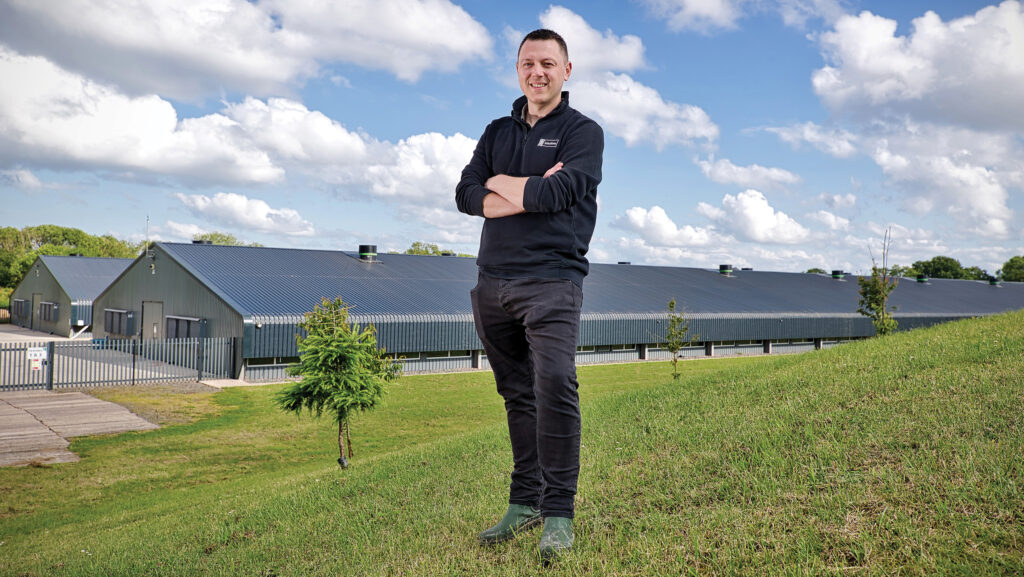Farmers Weekly Awards 2024: Poultry Farmer of the Year
 © Richard Stanton
© Richard Stanton Chris Wright of IEC Poultry, Market Drayton, Shropshire, is the 2024 Farmers Weekly Poultry Farmer of the year.
A passion for poultry and close attention to detail are two of the many attributes that make Chris Wright stand out from the flock.
Data analysis is equally important to his success as a broiler grower, though he is the first to admit that it is no substitute for understanding the sight, sound and smell of all that might be going on in a poultry shed.
See also: Farmers Weekly Awards 2024: Poultry Farmer of the Year finalists
Farm facts
- Four sheds housing 240,000 birds
- Established in 2016 by Keith Wilson of IEC Solutions (International Energy Crops)
- Ground-source heat pumps and biomass boilers
- Solar panels and batteries in situ
- Plans to build four more sheds on site
Chris has been involved in the poultrymeat sector for almost 15 years, starting as a stockman and working his way up, including time as a contract farmer for Moy Park.
He then spent 18 months working for the Applied Group, before joining IEC Poultry in 2020 where he now manages 240,000 birds in four sheds, supplying processor Maelor Foods.
Under Chris’s watchful eye, the farm has achieved numerous European production efficiency factor (EPEF) scores of over 400, with several of more than 440, placing his unit at the top of Maelor Foods’ league table.
Margins matter
But the real focus is on margin/sq m, and Chris is proud to have seen a 30% uplift in the four years he has been in charge.
“EPEF is a guide to performance, but it does not equate to profit,” he says.
A focus on detail is everything, from where to store top-up bales in the shed, to the height of the drinkers, while conducting twice-daily data analysis.
“We do benchmark performance against the rest of the group, but I’m more interested in benchmarking against myself, always aiming to improve on last year,” he says.
The figures speak for themselves, with just 3.3% mortality, 12% pododermatitis and a 51p/sq m margin uplift over four years.
There is also a focus on innovation.
For example, Chris has conducted successful trials with miscanthus as an alternative bedding material, and has devised his own “platinum” wash programme to create the best starter environment.
He also helped company O3T develop a drinking water system – the O2X machine – which uses “nano-bubble” technology to reduce pathogens in the drinker lines, without the need for chemicals.
This has led to fewer rejects, and Chris has invested his own money in the venture.
Plans are afoot to expand production with planning permission for four new sheds.
Consultancy
As well as overseeing production for IEC Poultry, Chris acts as a consultant for two other, larger units, supplying Avara Foods.
Applying a similar mindset to the way he runs his own unit, Chris has seen these farms shoot up the rankings, with one recently achieving an EPEF of more than 450.
“It is very rewarding to help other growers,” he says. “Through strategic guidance, I have propelled these farms into the top quarter of the Avara league table.”
Chris is always happy to share his data to help others improve and is looking to expand his consultancy role in the coming years.
Staff management is also important and Chris ensures his staff are offered at least two training courses a year.
Educating the public is another passion, and the farm – which has viewing windows in all the sheds – hosts regular school visits.
Winning ways
- Passion for the poultry sector
- Driven to improve performance every year
- Close attention to bird welfare
- Understands data, but does not rely on it
- Eager to share his knowledge
- An emerging talent in the poultry industry
What the judges say
“Chris Wright’s enthusiasm, dedication, innovation and willingness to share his knowledge with others illustrates all that is positive about the UK poultry sector. A worthy winner!”
The Farmers Weekly 2024 Poultry Farmer of the Year Award is sponsored by Aviagen
The Farmers Weekly Awards celebrate the very best of British agriculture by recognising hard-working and innovative farmers across the UK.
Find out more about the Awards, the categories and sponsorship opportunities on our Awards website.

